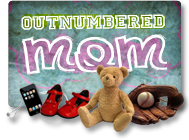 It's hard to see when they're toddlers or babes in arms, but so much of what we do now affects our later relationship with our children.
It's hard to see when they're toddlers or babes in arms, but so much of what we do now affects our later relationship with our children.Taking the long view of parenting helps you see this. It also gives you motivation for consistency now, because you know it will pay off later.
That has been the wisdom of traditional parenting for years, but it's rather interesting that recent university and professional studies support it. An article appeared in Slate, the online magazine, last month that was rather surprising. It summarized the findings of three university and professional studies on teen behavior. The advice to parents was, I felt, surprisingly traditional.
The article, in fact, calls the recommended parenting methods “mundane” and says they may strike you as “obvious, but that doesn’t mean they’re unimportant or necessarily easy to pursue.” The most effective parental responses to teens these days, it seems, are found by “sticking to the fundamentals of good parenting over the long haul.”
The first thing cited as important is to consider the company your child keeps. Monitoring your child is an especially effective method to do this. The study found with less parental monitoring, there was more risky teen behavior.
“But there is more to monitoring than cop-like surveillance, and quality matters as much as quantity.” This is where early family-building comes in. The families in which parents monitor “have stronger ties, are more involved with one another, have warmer relationships, and are more cohesive and communicate better. A more askable, approachable parent with a warm relationship to a child will have more success in monitoring without turning into a warden. To that end, it helps to make monitoring normal and mutual in your household—which you can model by talking to your children about your day at the dinner table or during rides in the car—and to begin early.”
And the second method for dealing with adolescent risk? Building and modeling bonds to conventional values. The article states, “Valuing schoolwork, time with family, and extracurricular activities are still rewarded in the long run in our society. Establishing routines and rituals within the family—special holidays, meals, weekly errands done together with a child, activities in the home that are a regular part of everyday life—can facilitate bonding to the family. Your valuing of reading and learning, teachers and their mission, doing well in school, and other aspects of education will be helpful in a preventive way later. This doesn't mean expecting perfect or high achievement, but it does mean explicitly valuing academic effort and an appreciation of school. And it also obliges you to model the behavior you want: not only respect for school but also moderation, reason, hard work, whatever you expect of your children.”
This article outlines a couple more "no-surprise surprises." Tune back in for Part 2, where we'll discuss developing competencies in your child and more on the parent-teen relationship.
For the long view of parenting,


 Put this button on your website or blog by copying and pasting the code below:
Put this button on your website or blog by copying and pasting the code below:






3 comments:
It's interesting to me that the more traditional ideas of parenting are coming around again. One thing that people forget is that while the so-called "experts" have interesting ideas sometimes, the reason why traditional techniques have become "traditional" is that they've been tested by time and they work.
That's an interesting article. The teen years can be so difficult. For me, humor helped alot, too.
Great post! Our oldest is 12(middle school) and these years are proving to be MUCH more difficult.
Post a Comment